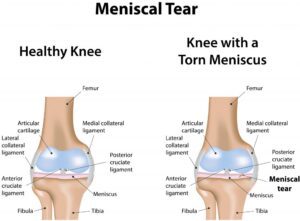We Are Open For Meniscus Tears Treatment in Gurgaon!
Fill the form and let us call you back.
Meniscus Tears Treatment and Management at Physioheal Physiotherapy, Gurgaon
Introduction to Meniscus Tears
A meniscus tear is a common injury in the knee, specifically among athletes and sports persons. A meniscus tear can be induced by twisting, bending, and a direct blow to the knee. Signs of a meniscus tear contain swelling, pain while walking, and knee instability.
Meniscus tears can be painful and weakening. Sadly, it’s completely common. A meniscal tear is the most repeatedly happening cartilage injury of the knee.
Covers the bones from wear and tear. Though all it takes is a sufficient twist of the knee to tear the meniscus. In some patients, a part of the teared-up cartilage cracks loose and catches in the knee, pushing it to lock up.

Symptoms of Meniscus Tears
Recognize the distinct symptoms associated with meniscus tears:
- Possible “pop” sound during injury.
- Initial ability to walk, followed by increasing stiffness and swelling after 2-3 days.
- Knee pain, particularly while moving.
- Sensation of the knee “giving way.”
- Limited knee movement and flexibility.
- Difficulty in flexing and straightening the leg.
- Occasional knee locking or getting “stuck.”
Causes of Meniscus Tears
Identify the triggers of meniscus tears:
- Forceful twisting or rotating of the knee, often during pivoting or abrupt stops.
- Activities like squatting, kneeling, or lifting heavy objects can contribute to tears.
- Degenerative changes in older adults, without trauma, can also lead to meniscus tears.
Types of Meniscus Tears
Differentiate between various types of meniscus tears:
- Intrasubstance/Incomplete Tear: Generally associated with degenerative changes, often spotted on MRI.
- Radial Tear: Common tear type within the avascular meniscus area, challenging to heal.
- Horizontal Tear: Responsive to repair, along the peripheral fibers of the meniscus.
- Flap Tear: Unique tear pattern, potentially treated by removing the affected flap.
- Complex Tear: Involves a mixture of tear patterns, often not suited for repair.
- Bucket–Handle Tear: Extensive tear causing knee locking, often requiring surgical intervention.
Diagnosis of Meniscus Tears
Explore the diagnostic methods for meniscus tears:
- X-rays: Rules out other knee issues but doesn’t directly detect meniscus tears.
- Magnetic Resonance Imaging (MRI): Provides detailed images of knee’s soft tissues.
- Arthroscopy: Direct visualization with a camera inserted into the knee joint for accurate diagnosis and treatment planning.
Role of Physiotherapy in Meniscus Tear Treatment
Understand how physiotherapy plays a vital role in treating meniscus tears:
- Acute Management
- Includes RICE protocol (Rest, Ice, Compression, Elevation) to reduce pain and swelling.
- Cryotherapy (Ice Application): Reduces soft tissue temperature, minimizes vasoconstriction and blood circulation.
- Electrotherapy Modalities: Interferential Therapy (IFT), TENS, Ultrasound Therapy, and Exercise Therapy for pain relief.
- Strengthening and Stretching Exercises: Focus on quadriceps and hamstrings muscles.
- Joint Mobilization: Enhances joint flexibility, crucial for knee and patellar mobility.
- Chronic Management
- Addressing decreased joint flexibility due to injury, edema, or immobilization.
- Joint Mobilization: Essential for various joints, including the superior tibiofibular and patellofemoral joints.
- Tibiofemoral joint mobilization enhances knee movement range.
Consultation and Effective Treatment
For comprehensive meniscus tear treatment, consult Dr. Divya Gaur at Physioheal Physiotherapy Gurgaon. Our expert physiotherapists collaborate closely with you, ensuring a successful rehabilitation journey. To book an appointment, call +91-9999259307, book online, or request a free phone consultation.
About Physioheal
Physioheal, led by the esteemed Dr. Divya Gaur, stands as the premier destination for top-tier physiotherapy in Gurgaon. Our dedicated team offers personalized care and effective solutions for a wide range of conditions, ensuring lasting relief and improved well-being. As Gurgaon’s leading physiotherapy clinic, we are committed to providing exceptional care under Dr. Divya Gaur’s guidance, making your journey to a pain-free life our primary goal.
